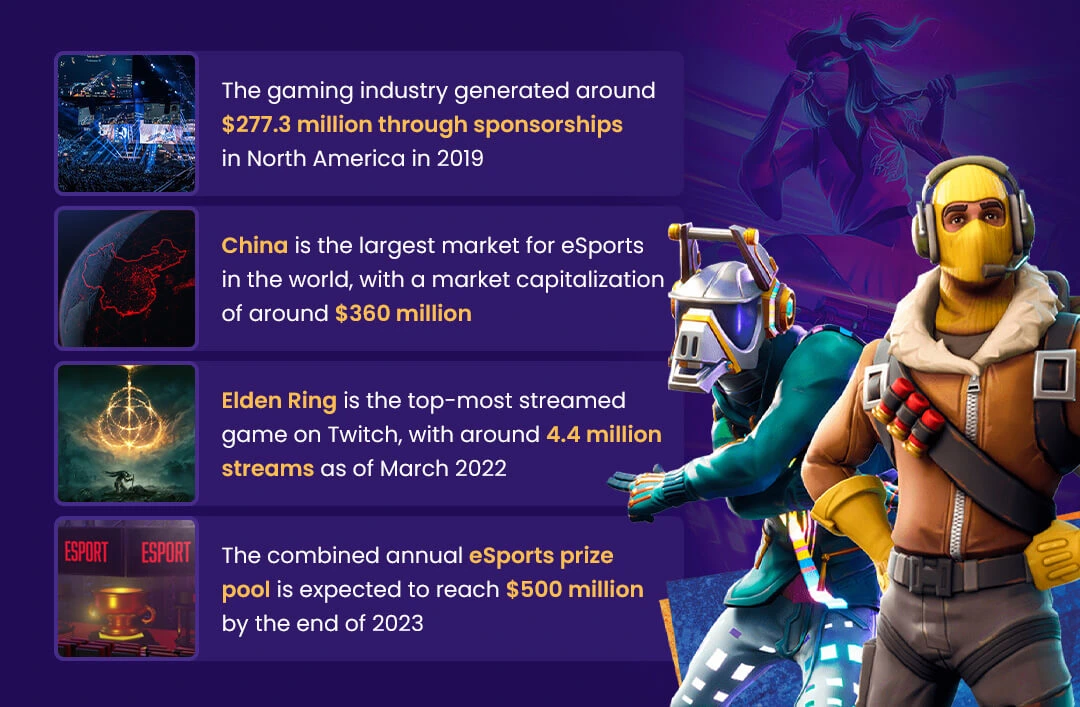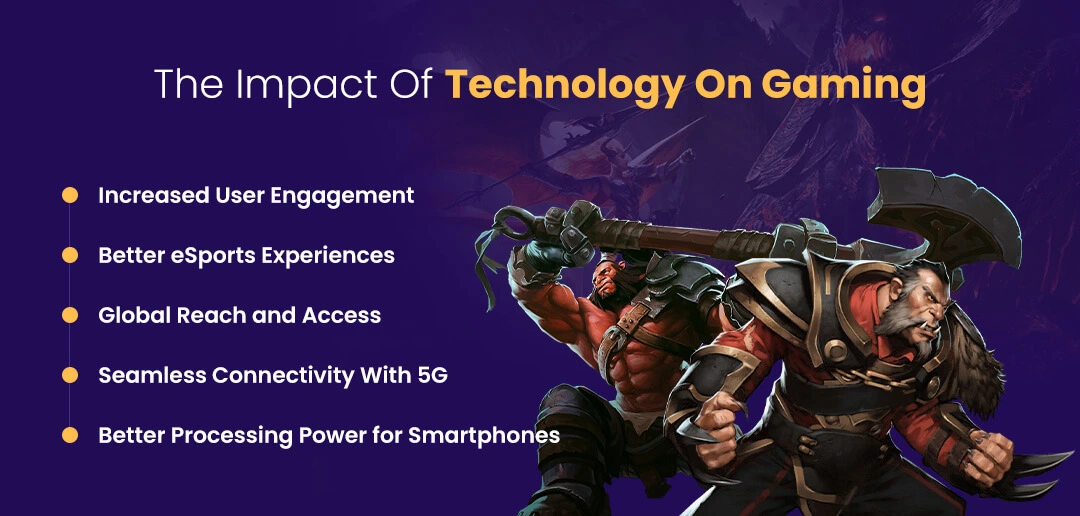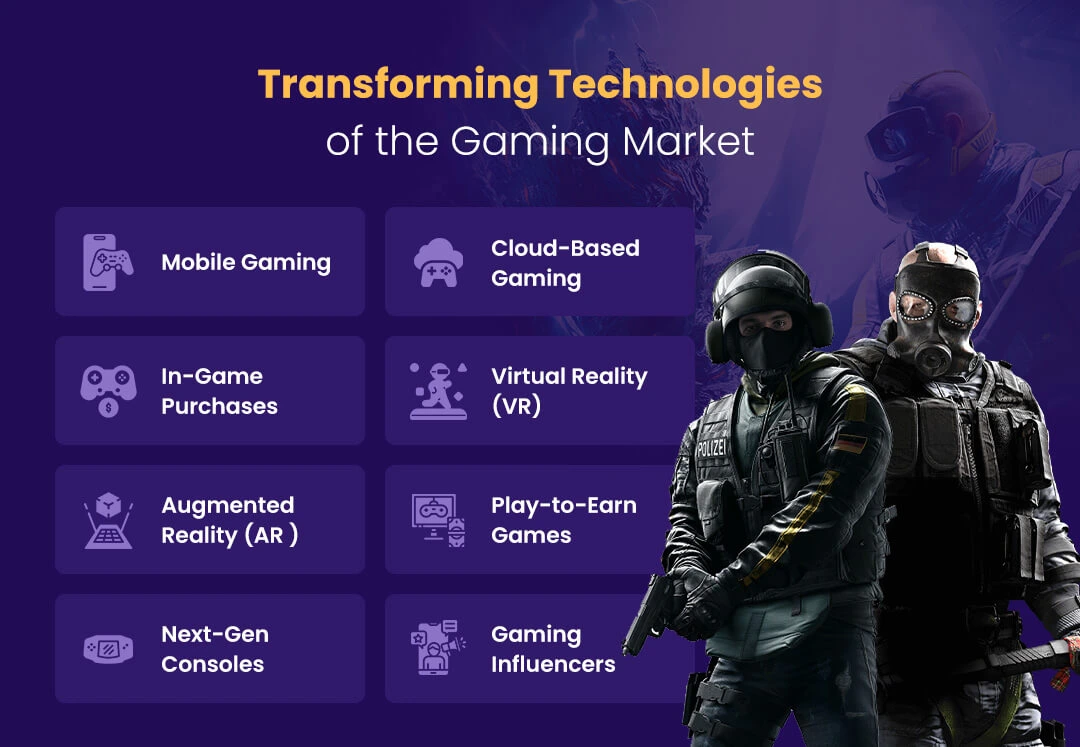The gaming world is changing, and it’s all thanks to the rise of eSports apps. What was once a niche form of entertainment has become one of the most popular forms in modern times, with millions around the globe tuning in to watch professional gamers compete for glory and prize money.
But what are these apps, and how have they transformed the gaming industry? In this article, we will look at how eSports apps have revolutionized competitive gaming. Moreover, we will explore the future aspect of eSports and how it will continue to shape the industry in years to come.
Before diving into how eSports mobile applications drive the most traction and transformation, let’s look at some statistics.
eSports Industry Statistics:

1. According to reports, sponsorships and advertisements generate the most revenue for the eSports industry in the US. In 2019, in North America only, the gaming industry generated around $277.3 million through sponsorships.
2. China is the largest market for eSports in the world, with a market capitalization of around $360 million. It’s approximately $70 million higher than the US market. In the third position after China and the US, western Europe’s eSports market is the biggest, with a total capitalization of around $205.8 million.
3. Elden Ring is the top-most streamed game on Twitch, with around 4.4 million streams as of March 2022. Other games that top the chart include Call of Duty: Warzone, VALORANT, Fortnite, and League of Legends.
4. The combined annual eSports prize pool is expected to reach $500 million by the end of 2024. In 2018, this figure was $159 million, and in 2017, it was around $115.51 million.
Looking at these statistics, it’s clear that the eSports industry is growing at an unprecedented rate, thanks in part to the rise of mobile apps. These apps provide a platform for gamers to play and compete in tournaments, access gaming content, watch live streams, connect with other gamers, follow their favorite teams and players, and so on.
Why Is The eSports App The Future And Beyond?
eSports apps are the future of gaming for a number of reasons. Firstly, they provide an easy and accessible way for gamers to participate in tournaments and compete with other players from around the world. This is made possible by dedicated mobile platforms that allow users to quickly join competitions, track their stats, and even live stream their gameplay.
Moreover, eSports apps are also driving an increase in the number of professional gamers, as more and more players have access to tools that allow them to become better at the game. This has resulted in a surge in the number of professional gaming leagues, tournaments, and championships, with prize money often reaching millions.
In addition, eSports apps provide users with access to a wealth of gaming content, from professional gamers streaming their gameplay live to educational videos and tutorials. This has made the eSports industry even more popular and accessible than ever before, as users are now able to engage with the world of competitive gaming in an entirely new way.
Looking ahead, eSports app development has the potential to revolutionize the gaming industry and provide a space for gamers to not only compete with each other but also create a robust connected community within the eSports world.
The Impact Of Technology On Gaming
The technological advancements will impact and grow the eSports industry. Cloud-based gaming platforms will be used to host on-demand tournaments with thousands of gamers competing at the same time. There are several growth aspects that cloud gaming offers to the eSports industry, such as:

1. Increased User Engagement
Cloud-based platforms enable gamers to compete the tournaments without any geographical or restrictions. This encourages users to engage more with the platform, thereby increasing user retention and monetization opportunities for game publishers. Moreover, it becomes easier for gaming companies to launch new tournaments and games, thereby further increasing user engagement.
2. Better eSports Experiences
With involvement of VR, AR, and AI technologies, gamers will be able to have an even more immersive experience while competing. This could lead to the creation of truly unique gaming experiences that will help drive the growth of the eSports industry. With a superior experience, gamers will be more likely to engage, thus leading to greater revenues.
3. Global Reach And Access
These gaming platforms will also provide gamers to access the tournaments and matches from any location, allowing them to play a wider variety of games at any time. This could lead to an increase in the number of people playing competitively and help to create a much larger global eSports community. In addition, cloud-based eSports gaming platforms are cost-effective than traditional gaming consoles, making it easier for gamers to access them.
4. Seamless Connectivity With 5G
The introduction of 5G will further change the landscape of gaming. With 5G technology in gaming, players can now access high-speed and low-latency gaming experiences that were previously not possible. This means gamers can now enjoy fast loading times and smooth gameplay without any lag or connection issues. Leveraging 5G bandwidth, gaming companies can now create even more immersive experiences for gamers that were previously not possible.
5. Better Processing Power For Smartphones
The development of gaming apps is further made possible by the increased processing power in modern smartphones. These powerful devices are now capable of running games with stunning graphics and smooth gameplay, something that was not possible until a few years ago. This has enabled developers to create even more complex and engaging experiences for gamers on mobile devices.
Transforming Technologies Of The Gaming Market

1. Mobile Gaming
The eSports industry has seen a tremendous boost in recent years due to advancements in mobile technology. Improved processing speeds and better graphics have allowed mobile devices to offer a gaming experience that rivals that of traditional PC and console systems.
This has made eSports more accessible to a wider audience, as mobile devices are more affordable and easier to use than traditional gaming setups. Additionally, the rise of mobile gaming platforms and tournaments has created an entirely new market for eSports, with new games and genres emerging.
As mobile technology continues to improve, we expect to see the eSports industry grow even larger, reaching new heights of popularity and profitability. Moreover, with 5G and cloud-based gaming platforms, the industry is likely to experience an even greater surge in growth with the help of the smartphone segment.
Popular eSports mobile games like Call of Duty Mobile, PUBG, and Fortnite have seen tremendous success in recent years, as they offer gamers an engaging experience with stunning graphics and exciting game mechanics. As mobile gaming continues to grow in popularity, eSports companies are likely to continue investing more in the development of their products.
2. Cloud-Based Gaming
The world of eSports has seen a remarkable transformation with the advent of cloud technology. It has been observed that gaming enthusiasts have embraced this technology readily and have benefitted from its innovative features.
Cloud technology has introduced an efficient and cost-effective way for eSports players to store and share game data. It provides dynamic virtual setups and real-time streaming, making it possible for gamers to play their favorite games from anywhere around the globe with no lag, thanks to the high-speed internet.
The utilization of cloud technology has also made it possible to integrate Artificial Intelligence (AI) into eSports games, thereby improving the gaming experience. As cloud computing technology continues to advance, there is no limit to how it will transform the eSports landscape in the coming years.
Products like Microsoft Azure, Amazon Web Services, and Google Cloud are paving the way for even more advanced gaming experiences. Developers are taking advantage of these services to get started with real-time competition or prediction gaming app development.
3. In-Game Purchases
Along with solving the storage issues, the cloud will also provide a platform to play games with real-time streaming and high performance. The best example of this is the popular game streaming platform Twitch, which offers gamers exclusive access to competitive tournaments and events.
The introduction of in-game purchases in eSports has been a significant change in the industry’s revenue model. In the past, most revenues came from sponsorships, advertisements, and ticket sales. However, with the rise of free-to-play games, companies have found a new way to generate revenue through in-game purchases.
This has the potential to increase competition in eSports as teams and players seek out new ways to optimize their gameplay and stay ahead of the competition. Additionally, it has also created new job opportunities in the industry, such as in-game item designers and analysts who specialize in maximizing revenue from these purchases.
On a broader perspective, the rise of in-game purchases has helped eSports to become a legitimate industry that is capable of generating massive revenues. As this trend continues, we can expect to see even more innovation in the industry, with new games, genres, and platforms emerging.
4. Virtual reality (VR)
The world of eSports has been rapidly growing in popularity over the past few years, and the integration of Virtual Reality (VR) technology is set to revolutionize the industry. With the ability to transport players and viewers into a fully immersive digital realm, VR will allow eSports to transcend traditional boundaries and achieve new levels of engagement.
One key advantage of VR in eSports is its ability to enhance the physical and mental experience of players, creating a deeper sense of presence and realism. Additionally, VR will provide a new dimension of spectatorship, enabling viewers to feel as though they are right in the middle of the action.
As technology continues to evolve, there is no doubt that VR will become a game-changer for eSports, redefining the way we interact with digital entertainment. With devices like the Oculus Rift and HTC Vive, we can look forward to a future of highly immersive and interactive eSports experiences.
Moreover, with the growing affordability of VR devices, we can also expect to see more and more people taking part in the world of eSports. This could open up a whole new market for game developers, players, and spectators alike.
5. AR (Augmented Reality)
Augmented Reality (AR) is transforming the gaming industry in terms of user experience and interaction. With the implementation of AR technology, gamers can now fully immerse themselves in the game environment and interact with the virtual elements in real time.
AR has enabled game developers to create more realistic and engaging games, as it allows them to integrate real-world objects and features into the gaming experience. Additionally, AR has enabled multiplayer gaming to become more accessible, as players can take part in games from different locations worldwide.
The future for AR in gaming is a bright one as developers continue to explore and exploit the possibilities of this technology. With the growing Metaverse and the increasing availability of AR devices, this technology is set to revolutionize the eSports industry.
Metaverse technology will allow users to actively interact with each other, regardless of their location. This level of engagement will help to deepen the relationships between gamers and create a more social and immersive gaming environment.
Companies like Meta and Unity are already taking advantage of the opportunities that this technology offers, with their respective platforms providing users with a fully immersive network for gaming and communication. They’re heavily investing in the development of Metaverse, and this is set to revolutionize the way we experience gaming.
6. Play-To-Earn Games
Play-to-Earn games have been gaining immense popularity in recent years, and it is no surprise why. Intertwining blockchain technology with gaming, these games offer players the opportunity to earn cryptocurrency or non-fungible tokens (NFTs) by playing.
With the potential to earn significant amounts of money, more and more individuals are venturing into this rapidly growing industry. The future of Play-to-Earn games seems bright, with experts predicting that it will only continue to expand as more developers create games and more players join the movement.
As blockchain technology becomes increasingly accessible, and with more advancements in the space, it is likely that we will see an increase in both the quality and quantity of Play-to-Earn games available. Overall, it is clear that Play-to-Earn games are here to stay and have a promising future ahead.
Games like CryptoKitties, Gods Unchained, and Axie Infinity are paving the way for a new era of gaming that merges innovation with financial rewards. Moreover, these games present a path for mainstream adoption of blockchain technology, which could open the door to even more opportunities in the future.
7. Next-Gen Consoles
Advanced Next-Gen Consoles are rapidly changing the gaming world as we know it. Their impact is evident in the increasingly realistic graphics, immersive experiences, and lightning-fast processing speeds. The development of these consoles has enabled game developers to push the limits of what is possible in gaming, delivering seamless gameplay and incredibly realistic environments.
Additionally, gamers themselves have benefited from the advancements in console technology, with increased social features and online connectivity that have transformed gaming into a truly global phenomenon.
As technology continues to advance, we can only expect the gaming world to become even more immersive and engaging, connecting players from around the world in ways we never thought possible. Companies looking to gain an edge in the market can hire dedicated game development team and game engine developers to adapt their games for next-gen consoles and ensure they are future-ready.
From professional gamers’ perspective, the increased processing power of next-gen consoles has enabled them to raise their level of play, resulting in higher levels of competition across all titles. Along with this, the rise of streaming services has enabled eSports players to share their experiences and engage with their fans in new and exciting ways.
8. Gaming Influencers
Gaming influencers have become a prominent and growing part of the gaming industry. These individuals not only boast a large following in the gaming community, but they also have developed expertise in the latest games, hardware, and platforms.
They’ve proven to be effective ambassadors for new product releases and updates, as their followers often look to their reviews and recommendations before making purchases. Gaming influencers bring a unique perspective to the industry that can engage and inform audiences.
With the continued expansion of the gaming world and the growing influence of social media platforms, gaming influencers are expected to play an even more significant role in the industry in the years to come.
Similar to social media influencers in other industries, gaming influencers can add significant value by connecting sponsors with their followers and increasing brand awareness. Companies are increasingly relying on influencers to reach their target audiences and make an impact on the gaming industry.
In a couple of years, we will see an even greater influence from gaming influencers as the industry continues to expand and evolve with more opportunities for collaboration between corporate sponsors and individual influencers.
How Can Businesses Capitalize On eSports Opportunities?
There are several opportunities available for businesses looking to capitalize on the explosive growth of eSports.
One of the most apparent avenues is to invest in or sponsor professional eSports teams. Sponsors can benefit from the massive exposure that comes with being associated with successful eSports teams. In addition, businesses can use their sponsorships to leverage their own brand and connect with a passionate fan base.
Businesses can host their own tournaments and leagues or sponsor existing ones. This can increase brand awareness and engagement with the wider gaming community. Additionally, companies can launch their own betting markets, which can be a great way to drive profits and generate additional revenue streams.
Companies can also invest in the development of eSports apps, which are becoming increasingly popular. These apps allow players to connect with their favorite teams, track tournaments and standings, access exclusive content, and more. eSports apps are a great way for a company to stay at the forefront of gaming trends and engage with the growing eSports community.
It’s crucial for organizations to hire an experienced and professional game app development company like Auxano Global Services. On this note, let’s explore why to hire AGS for eSports app development services.
Why Hire Auxano Global Services For eSports Development Services?
Auxano Global Services is a leading eSports app development company offering customized solutions to clients. AGS has an experienced team of developers that are proficient in developing advanced mobile applications for the gaming and the eSports industry.
With years of experience in developing mobile applications for the gaming industry, AGS can deliver the best solutions that are tailored to meet your specific needs. We ensure that your application is built on the best coding practices and technologies, thus delivering an efficient, robust, and secure solution.
Wrapping Up!

The global gaming market is growing at an impressive rate, and eSports are playing a major role in driving this growth. As the industry continues to expand, the demand for eSports mobile applications will increase. Therefore, businesses need to partner with experienced eSports app development companies like Auxano Global Services to ensure that their apps are designed, developed, and launched successfully.
Frequently Asked Questions
-
1. Why Is eSports The Future Of The Gaming Industry?
eSports is rapidly becoming one of the most popular forms of gaming in the world, as it offers an immersive and engaging experience. As technology continues to improve, eSports provides gamers with an ever-evolving challenge and entertainment opportunity.
-
2. Which Technologies Are Used For eSports Apps?
eSports apps often use a variety of technologies, such as HTML5, Java, and C++. Additionally, the use of Augmented Reality (AR) and Virtual Reality (VR) technology is becoming increasingly popular in the development of eSports applications.
-
3. How Can Businesses Capitalize On The Increasing Popularity Of eSports?
Businesses can capitalize on the growing popularity of eSports by investing in or sponsoring professional teams, hosting tournaments, launching betting markets, and investing in the development of eSports apps.
-
4. Why Is eSports The Future?
eSports is the future of gaming because it offers an immersive, engaging experience that continues to evolve with technology. Additionally, it has a massive and passionate fan base which businesses can leverage to increase brand awareness and boost their own profits.
-
5. How Do eSports Apps Benefit Businesses?
eSports apps benefit businesses by helping them increase engagement with their target audience and generate additional revenue streams. They can also help boost brand awareness and drive profits in gaming.





